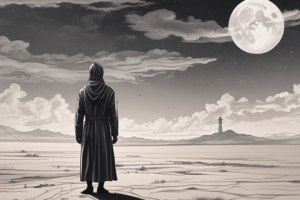Podcast
Questions and Answers
What is the main focus of Hannah Arendt's book 'The Human Condition'?
What is the main focus of Hannah Arendt's book 'The Human Condition'?
- The history of labor throughout different time periods
- The distinction between vita activa and vita contemplativa (correct)
- The importance of individualism in philosophy
- The rise of the social realm in modern society
According to Arendt, what is the realm of freedom in ancient Greece?
According to Arendt, what is the realm of freedom in ancient Greece?
- The public realm (correct)
- The realm of work
- The private realm
- The realm of labor
What is the difference between labor and work according to Arendt?
What is the difference between labor and work according to Arendt?
- Labor is the process of creating durable objects, while work is directed at meeting biological necessities
- Labor and work are interchangeable terms in Arendt's book
- Labor is cyclical and directed at meeting biological necessities, while work has a clearly defined beginning and end and leaves behind durable objects (correct)
- Labor is the process of creating temporary objects, while work has a clearly defined beginning and end
What is the social realm according to Arendt?
What is the social realm according to Arendt?
What is the means by which humans disclose themselves to others according to Arendt?
What is the means by which humans disclose themselves to others according to Arendt?
What has the modern age been characterized by according to Arendt?
What has the modern age been characterized by according to Arendt?
What does science exalt according to Arendt?
What does science exalt according to Arendt?
What is still possible in free societies according to Arendt, despite the modern age's challenges?
What is still possible in free societies according to Arendt, despite the modern age's challenges?
What are the solutions that Arendt offers to the problems that action creates?
What are the solutions that Arendt offers to the problems that action creates?
Flashcards
'The Human Condition' Main Focus?
'The Human Condition' Main Focus?
Focuses on the distinction between vita activa (active life) and vita contemplativa (contemplative life).
Realm of Freedom (Ancient Greece)?
Realm of Freedom (Ancient Greece)?
The public realm.
Arendt's Labor vs. Work?
Arendt's Labor vs. Work?
Labor is cyclical for biological needs; work creates durable objects.
The Social Realm?
The Social Realm?
Signup and view all the flashcards
Means of Self-Disclosure?
Means of Self-Disclosure?
Signup and view all the flashcards
Characterized the Modern Age?
Characterized the Modern Age?
Signup and view all the flashcards
What does Science Exalt?
What does Science Exalt?
Signup and view all the flashcards
Still Possible in Free Societies?
Still Possible in Free Societies?
Signup and view all the flashcards
Solutions to Action's Problems?
Solutions to Action's Problems?
Signup and view all the flashcards
Study Notes
Summary of "The Human Condition" by Hannah Arendt:
- The book was first published in 1958 and has a prologue and six parts.
- Arendt distinguishes between vita activa and vita contemplativa, focusing on the former.
- The vita activa can be divided into labor, work, and action, which have all changed throughout history.
- In ancient Greece, the public and private realms were separated, with the former being a realm of freedom and the latter being a realm of necessity.
- Feudal lords ran their lands as private realms, and the modern period saw the rise of the social realm, which Arendt views as a threat to the other two realms.
- Labor is a cyclical process directed at meeting biological necessities, and work has a clearly defined beginning and end, leaving behind durable objects.
- Action is the means by which humans disclose themselves to others, distinguishing themselves as unique and unexchangeable beings.
- The modern age has been characterized by events that increase our alienation from the world, leading to an intense focus on the self in philosophy.
- Science has exalted the life of work over the life of contemplation, making us a society of laborers.
- Action is still possible in free societies, but fragile.
- Arendt offers solutions to the problems that action creates: forgiveness and promises.
- Human plurality is the basic condition of both action and speech.
Studying That Suits You
Use AI to generate personalized quizzes and flashcards to suit your learning preferences.




